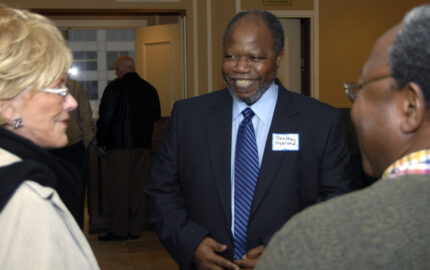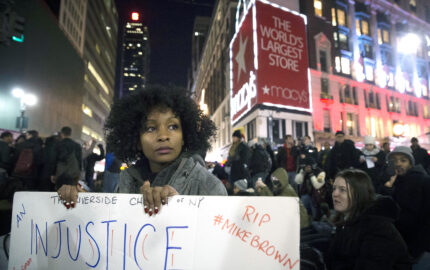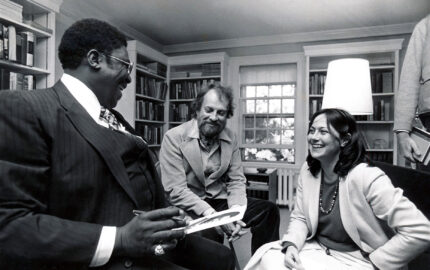
Islam: Reporting in Context and With Complexity
This collection of articles explores the challenges journalists encounter in their coverage of Islam in the wake of 9/11. Words and images that follow speak to these difficulties but also address ways in which journalists—and scholars who study Islam—are striving to anchor their work in a knowledgeable context and imbue it with essential layers of complexity.
Don Imus didn't only insult the Rutgers women's basketball team, he insulted me. I had spent most of my Nieman year happily liberated from the tyranny of straight hair. At Harvard I felt that I was judged not by what was happening on the outside of my head but by what was occurring inside of it. I was happily immersed in the freedom of this idyllic academic setting when Imus' scurrilous words about black women's hair dragged me back into the real world where I make my living.
I'm a broadcast journalist. Employed in a visual medium, I have had more discussions about my hair with news managers over a 30-year career than I ever wanted to think about. So when the Imus imbroglio hit, I was reminded of my first broadcasting job at Channel 13 in Indianapolis.
It was the 70's. I was in my 20's, and the black revolution's cultural mantra, "black is beautiful," had helped give me the confidence and self-esteem to believe that I could take the leap from print journalism to broadcasting. There were almost no black women working in television news at the time, virtually no role models for me to emulate, so I made my own way. I had won awards for newspaper writing and submitted my clippings and got the job. I was told by the news director, a white man, that I was hired based on my skills as a writer and reporter. He was a blunt but nurturing teacher who shared his knowledge and skill to teach me the intricacies and subtleties of broadcast journalism. His role in my career is immeasurable. It was during one of our after-the-news critique sessions that our unforgettable conversation occurred.
"Renee, you're going to have to get rid of that Afro," he said.
"What do you mean get rid of my 'fro?," I shot back.
"We're getting a lot of calls from our viewers. They say you look militant, like Angela Davis. You're scaring them!"
I argued that they should be looking at my reports, not looking at my hair. He replied that they couldn't see my reports because my hair was a distraction. There was no documentation of the race of the callers, but I assumed they were white.
"You're saying I scare white people," I said, as our words became more heated.
My news director artfully stepped around what was the elephant in this room. "Black militants scare all kinds of people, black and white," he said. "We're not in the business of chasing off viewers." The threat was implicit—lose your Afro or lose your job.
Ironically, I had been thinking of straightening my hair, because I had gotten bored with the 'fro. I wanted to change my hair as a matter of fashion and was contemplating undergoing the lye-driven, scalp-burning process just to change my look. But after this confrontation, I knew I couldn't. I realized that my natural hair was making a powerful statement about my identity, about my blackness. It symbolized a demand for acceptance of me from the inside, beyond external issues of skin color and hair texture.
I kept the Afro for a year, wasn't fired, and when I did straighten my hair, there were people who called the TV station to complain about that, too.
The Never-Ending Conversation
During the next three decades as my career took me to Chicago, Atlanta and New York, as I moved from local news to network news and back to Chicago local news where I now work as an investigative reporter, the conversation about my hair, clothes and makeup has become more intense. Be clear, it isn't our only conversation. Mostly the talk involves news stories, ethics, journalistic content, legal issues, and newsgathering. But "neat" hair, the latest code for "straight hair," always lies just beneath the surface, waiting to raise its nappy head, on any rainy day.
I have fought hard to build my reputation as a solid, fair, hardworking journalist. It hasn't been easy, and I believe my journey has helped open doors for women who are serious about reporting. Broadcast journalists working at commercial TV stations operate inside an entertainment setting. Viewers tune in to see "The Wedding Crashers," "Dancing With the Stars," and "American Idol." Newscasts ask people who are there to be entertained to make the mental switch from fun and frivolity to more serious issues of the day. Keeping them from turning away is a huge challenge that TV news producers face with a level of skill and ingenuity that is not understood or appreciated by much of the news establishment.
Part of what's thought about in negotiating all of this is how reporters and anchors look on the air. In our highly competitive news environment, the issue becomes one of marketing and promotion so the journalism we work hard to do is seen and heard. And it is in that context that my "corporate" hair evolved.
When my Nieman year began, my hair was straight; by January my Afro was back. Returning to work, my news director, an African-American woman, insisted that I return to my straight, neat, corporate (whatever you want to call it) not-nappy, hair again. Thirty years have passed since this same issue was raised with me and, while the messenger was decidedly different, the message was the same: "Welcome back, but leave the Afro at Harvard."
When Don Imus spoke of "nappy-headed hos," he stepped onto the third rail of American social commentary. Black women spent two billion dollars last year on hair-care products, straightening, weaving, braiding, all in pursuit of non-nappy hair. Imus's comments, with their historically explosive implications about black women, wild hair and wild sex, were a slap, a smack-down of innocents, and a form of slanderous speech with no result other than to diminish and demean.
For African-American women, they were fighting words—they always have been. For me, they were a reminder that when it comes to the issue of image, beauty and acceptance, America is actually not far removed from where we were in the 70's. It made me wonder if, as a pioneer in broadcast journalism, I hadn't contributed to that lack of progress by conforming to a more widely acceptable image to promote my career. Did I give up the chance, through my position on TV, to normalize nappy? Has my continuing failure to confront the issue inside my workplace contributed to our nation's ongoing obsession with a standard of beauty that, when it comes to hair, is decidedly non-black? Is my straight hair to blame?
Maybe I ought to just cover it up with a white cowboy hat and get a job on the radio.
Renee Ferguson, a 2007 Nieman Fellow, is an investigative reporter for WMAQ TV, NBC-5 in Chicago, Illinois.
I'm a broadcast journalist. Employed in a visual medium, I have had more discussions about my hair with news managers over a 30-year career than I ever wanted to think about. So when the Imus imbroglio hit, I was reminded of my first broadcasting job at Channel 13 in Indianapolis.
It was the 70's. I was in my 20's, and the black revolution's cultural mantra, "black is beautiful," had helped give me the confidence and self-esteem to believe that I could take the leap from print journalism to broadcasting. There were almost no black women working in television news at the time, virtually no role models for me to emulate, so I made my own way. I had won awards for newspaper writing and submitted my clippings and got the job. I was told by the news director, a white man, that I was hired based on my skills as a writer and reporter. He was a blunt but nurturing teacher who shared his knowledge and skill to teach me the intricacies and subtleties of broadcast journalism. His role in my career is immeasurable. It was during one of our after-the-news critique sessions that our unforgettable conversation occurred.
"Renee, you're going to have to get rid of that Afro," he said.
"What do you mean get rid of my 'fro?," I shot back.
"We're getting a lot of calls from our viewers. They say you look militant, like Angela Davis. You're scaring them!"
I argued that they should be looking at my reports, not looking at my hair. He replied that they couldn't see my reports because my hair was a distraction. There was no documentation of the race of the callers, but I assumed they were white.
"You're saying I scare white people," I said, as our words became more heated.
My news director artfully stepped around what was the elephant in this room. "Black militants scare all kinds of people, black and white," he said. "We're not in the business of chasing off viewers." The threat was implicit—lose your Afro or lose your job.
Ironically, I had been thinking of straightening my hair, because I had gotten bored with the 'fro. I wanted to change my hair as a matter of fashion and was contemplating undergoing the lye-driven, scalp-burning process just to change my look. But after this confrontation, I knew I couldn't. I realized that my natural hair was making a powerful statement about my identity, about my blackness. It symbolized a demand for acceptance of me from the inside, beyond external issues of skin color and hair texture.
I kept the Afro for a year, wasn't fired, and when I did straighten my hair, there were people who called the TV station to complain about that, too.
The Never-Ending Conversation
During the next three decades as my career took me to Chicago, Atlanta and New York, as I moved from local news to network news and back to Chicago local news where I now work as an investigative reporter, the conversation about my hair, clothes and makeup has become more intense. Be clear, it isn't our only conversation. Mostly the talk involves news stories, ethics, journalistic content, legal issues, and newsgathering. But "neat" hair, the latest code for "straight hair," always lies just beneath the surface, waiting to raise its nappy head, on any rainy day.
I have fought hard to build my reputation as a solid, fair, hardworking journalist. It hasn't been easy, and I believe my journey has helped open doors for women who are serious about reporting. Broadcast journalists working at commercial TV stations operate inside an entertainment setting. Viewers tune in to see "The Wedding Crashers," "Dancing With the Stars," and "American Idol." Newscasts ask people who are there to be entertained to make the mental switch from fun and frivolity to more serious issues of the day. Keeping them from turning away is a huge challenge that TV news producers face with a level of skill and ingenuity that is not understood or appreciated by much of the news establishment.
Part of what's thought about in negotiating all of this is how reporters and anchors look on the air. In our highly competitive news environment, the issue becomes one of marketing and promotion so the journalism we work hard to do is seen and heard. And it is in that context that my "corporate" hair evolved.
When my Nieman year began, my hair was straight; by January my Afro was back. Returning to work, my news director, an African-American woman, insisted that I return to my straight, neat, corporate (whatever you want to call it) not-nappy, hair again. Thirty years have passed since this same issue was raised with me and, while the messenger was decidedly different, the message was the same: "Welcome back, but leave the Afro at Harvard."
When Don Imus spoke of "nappy-headed hos," he stepped onto the third rail of American social commentary. Black women spent two billion dollars last year on hair-care products, straightening, weaving, braiding, all in pursuit of non-nappy hair. Imus's comments, with their historically explosive implications about black women, wild hair and wild sex, were a slap, a smack-down of innocents, and a form of slanderous speech with no result other than to diminish and demean.
For African-American women, they were fighting words—they always have been. For me, they were a reminder that when it comes to the issue of image, beauty and acceptance, America is actually not far removed from where we were in the 70's. It made me wonder if, as a pioneer in broadcast journalism, I hadn't contributed to that lack of progress by conforming to a more widely acceptable image to promote my career. Did I give up the chance, through my position on TV, to normalize nappy? Has my continuing failure to confront the issue inside my workplace contributed to our nation's ongoing obsession with a standard of beauty that, when it comes to hair, is decidedly non-black? Is my straight hair to blame?
Maybe I ought to just cover it up with a white cowboy hat and get a job on the radio.
Renee Ferguson, a 2007 Nieman Fellow, is an investigative reporter for WMAQ TV, NBC-5 in Chicago, Illinois.


